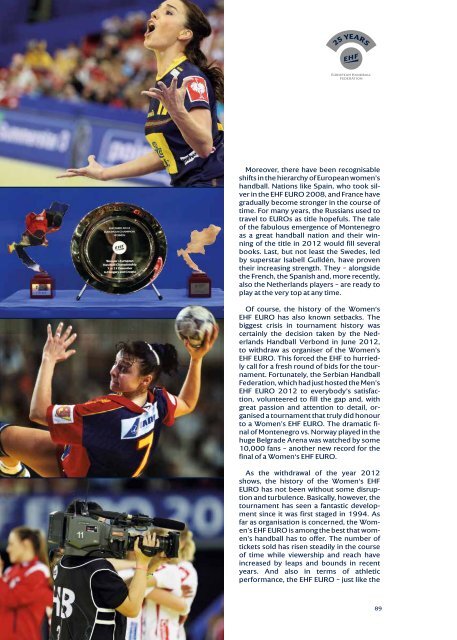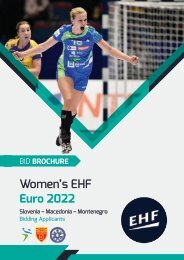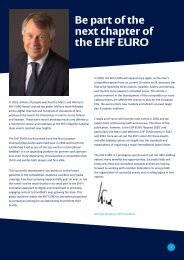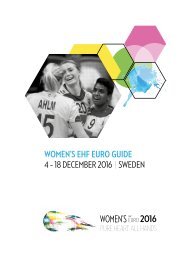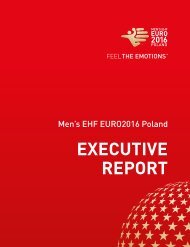ehf_25yers_book_webversion
Create successful ePaper yourself
Turn your PDF publications into a flip-book with our unique Google optimized e-Paper software.
Moreover, there have been recognisable<br />
shifts in the hierarchy of European women’s<br />
handball. Nations like Spain, who took silver<br />
in the EHF EURO 2008, and France have<br />
gradually become stronger in the course of<br />
time. For many years, the Russians used to<br />
travel to EUROs as title hopefuls. The tale<br />
of the fabulous emergence of Montenegro<br />
as a great handball nation and their winning<br />
of the title in 2012 would fill several<br />
<strong>book</strong>s. Last, but not least the Swedes, led<br />
by superstar Isabell Gulldén, have proven<br />
their increasing strength. They – alongside<br />
the French, the Spanish and, more recently,<br />
also the Netherlands players – are ready to<br />
play at the very top at any time.<br />
Of course, the history of the Women‘s<br />
EHF EURO has also known setbacks. The<br />
biggest crisis in tournament history was<br />
certainly the decision taken by the Nederlands<br />
Handball Verbond in June 2012,<br />
to withdraw as organiser of the Women’s<br />
EHF EURO. This forced the EHF to hurriedly<br />
call for a fresh round of bids for the tournament.<br />
Fortunately, the Serbian Handball<br />
Federation, which had just hosted the Men’s<br />
EHF EURO 2012 to everybody’s satisfaction,<br />
volunteered to fill the gap and, with<br />
great passion and attention to detail, organised<br />
a tournament that truly did honour<br />
to a Women’s EHF EURO. The dramatic final<br />
of Montenegro vs. Norway played in the<br />
huge Belgrade Arena was watched by some<br />
10,000 fans – another new record for the<br />
final of a Women‘s EHF EURO.<br />
As the withdrawal of the year 2012<br />
shows, the history of the Women‘s EHF<br />
EURO has not been without some disruption<br />
and turbulence. Basically, however, the<br />
tournament has seen a fantastic development<br />
since it was first staged in 1994. As<br />
far as organisation is concerned, the Women’s<br />
EHF EURO is among the best that women’s<br />
handball has to offer. The number of<br />
tickets sold has risen steadily in the course<br />
of time while viewership and reach have<br />
increased by leaps and bounds in recent<br />
years. And also in terms of athletic<br />
performance, the EHF EURO – just like the<br />
89


